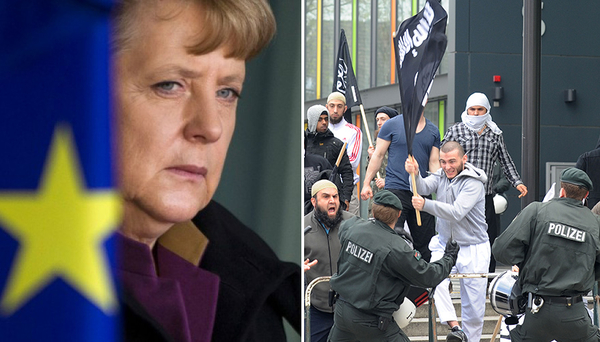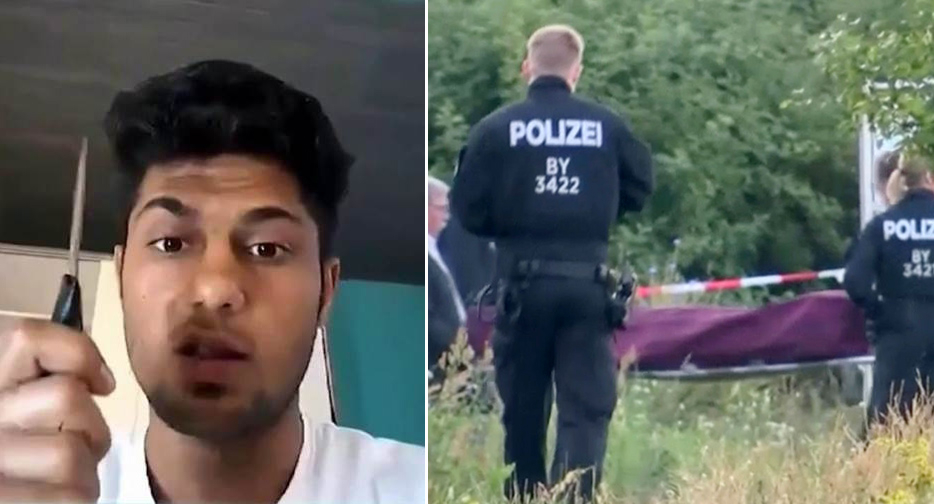Asylum seekers from Africa, Asia and the Middle East are continuing to pour into Germany in record numbers, despite freezing temperatures and snow.
More than 180,000 migrants arrived during the first three weeks of November, on track to surpass the previous monthly record of 181,000 migrants recorded in October.
With 300 newcomers now arriving every hour, Germany is expected to receive more than one million asylum seekers in 2015, and at least as many in 2016. After factoring in family reunifications, the actual number of migrants could exceed 10 million, and some believe that Germany’s Muslim population is on track to nearly quadruple to an astonishing 20 million by 2020.
German voters are beginning to wake up to the true cost — financial, social and otherwise — of the migration crisis, but they apparently do not have much say about the future direction of their country. According to Walter Lübcke, the district president of Kassel, a city in state of Hesse, citizens who disagree with the government’s open-door immigration policy are “free to leave Germany.”
What follows is a brief round-up of recent developments, which offer a glimpse into Germany’s future:
Matthias Lücke, senior researcher at the Kiel Institute of the World Economy (Institut für Weltwirtschaft, IfW), estimates that the migrant crisis will end up costing German taxpayers at least 45 billion euros a year, or more than four times the 10 billion euros forecast by the federal government. Lücke says tax increases are the only way to pay for this expenditure.
Gabriel Felbermayr, director of the Munich-based Center for International Economics (Ifo Zentrum für Außenwirtschaft), estimates that the migrant crisis will cost German taxpayers 21.1 billion euros this year alone. “This includes costs for housing, food, day care centers, schools, German language courses, training and administration,” he said in an interview with Der Spiegel.
N24 television news reports that up to 50% of the asylum seekers arriving in Germany have gone into hiding and their whereabouts are unknown by German authorities. They presumably involve economic migrants and others who are trying to avoid deportation if or when their asylum applications are rejected.
In a bestselling new book, Tania Kambouri, a German police officer, describes the deteriorating security situation in Germany due to migrants who have no respect for law and order. In an interview with Deutschlandfunk radio, she said:
“For weeks, months and years I have noticed that Muslims, mostly young men, do not have even a minimum level of respect for the police. When we are out patrolling the streets, we are verbally abused by young Muslims. There is the body language, and insults like ‘sh** cop’ when passing by. If we make a traffic stop, the aggression increases ever further, this is overwhelmingly the case with migrants.
“I wish these problems were recognized and clearly addressed. If necessary, laws need to be strengthened. It is also very important that the judiciary, that the judges issue effective rulings. It cannot be that offenders continue to fill the police files, hurt us physically, insult us, whatever, and there are no consequences. Many cases are closed or offenders are released on probation or whatever. Yes, what is happening in the courts today is a joke.
“The growing disrespect, the increasing violence against police… We are losing control of the streets.”
A video showing a Muslim threatening a German man openly on the street was posted on YouTube. The Muslim can be heard saying:
“I am telling you honestly, Islam will come to Germany, whether you like it or not. Your daughter will wear a headscarf (hijab). Your son will wear a beard. Okay. And your daughter will marry a bearded man.
“We are reproducing faster and faster. You Germans are not getting any children. In the best case you get two children. We make seven to eight children. Okay mate? And then we take four wives each, then we have 22 children. Maybe you Germans have one child and a dog. Huh? And that’s it.
“Mate. This is not our fault, it is your fault. If you exploited our countries, colonized our countries, so that you can drive a Mercedes and use your digital camera, huh?
“So Allah (blessed be his name), the Almighty God, will make it so that we will conquer you. Not with war, here in Germany, but with birth rates, first and foremost. Secondly, we will marry your daughters. And your daughter will wear a Muslim headscarf. That is how it is. Now you can get really mad. I can see the hate in your eyes.”
Another video shows hundreds of Muslims, some carrying the black flag of jihad, marching through the streets of downtown Hannover.
Amid a growing sense of insecurity, Germans are increasingly taking measures to protect themselves. Sales of pepper spray have skyrocketed by 600% during the past two months and stores across Germany are all sold out, according to the German newsmagazine Focus. Manufacturers say additional supplies will not be available for another six or seven weeks. “Manufacturers and distributors say the huge influx of foreigners in recent weeks has apparently frightened many people,” according to Focus.
Wolfgang Wehrend, chairman of the Military Reserve Association (Reservistenverbandes) in North Rhine-Westphalia, called on the government to reinstate compulsory military service for all men and women in Germany aged 18 and over. “It is about the security of our country,” he told the Rheinische Post. Germany formally ended conscription in July 2011. Wehrend said conscription could also be a way to promote integration:
“When young people work together as a matter of course in the army, the Federal Agency for Technical Relief (Technischen Hilfswerk), the fire brigades, the relief and care services, people from different ethnic groups and religions may grow closer. At least there is a chance.”
Meanwhile, the guardians of German multiculturalism unleashed a firestorm of criticism against Jürgen Mannke, director of the Teacher’s Association of Saxony-Anhalt (Philologenverbandes Sachsen-Anhalt, PhVSA), after he advised underage female students to guard against “superficial sexual adventures” with Muslim asylum seekers. In the group’s quarterly membership magazine, Mannke wrote:
“An immigrant invasion is inundating Germany. Many citizens are ambivalent about this. There is no doubt that it is our human duty to help people who are facing existential distress due to war and political persecution. But it is extremely difficult to distinguish these people from those who come to our country for purely economic or even criminal motives.
“If one examines the current images of the waves of refugees, one cannot overlook that many young, strong, mostly Muslim men have chosen to apply for asylum in Germany, because they find ideal conditions here, or so they think.
“Many of the men come here without their families or wives, and certainly not always with the most honest of intentions. From our ethical and moral perspective, women are not treated equally in Muslim countries and often are not treated with dignity. It is only natural that these young, often uneducated men also have a need for sex.
“Against the backdrop of their ideas about the role of women in their Muslim cultures, the question remains: how can they live out their sexuality or seek relationships in Germany without conflicting with the norms of our society?
“Already, we hear from conversations with acquaintances in many places about sexual harassment in their daily lives, especially on public transportation and in supermarkets. As responsible educators, we ask ourselves: How can we enlighten our young girls aged 12 and up so that they do not engage in superficial sexual adventures with often certainly attractive Muslim men?”
Mannke later apologized for his politically incorrect choice of words: “I hereby declare that I never intended to defame people of other religions, nations and cultures or to foment fear to serve nationalistic stereotypes or to generalize.”
In Bad Tölz, a town in Bavaria, local politicians and the media branded the managers of the “Brucklyn” discotheque as “Nazis” and “racists” after they banned male migrants from the premises. German women had complained that the men were harassing them, even following them into the female restroom.
The club’s manager, Thomas Greil, said he had no other option: he was concerned about the wellbeing of the female patrons. He said that after a group of 30 or 40 migrants arrived, native Germans left the club in droves.
In a statement, Greil said:
“We are not excluding anyone, we are just trying to run a business. If we ignore the complaints of our female guests, we have to expect that many of our regular customers will stay away for the short or long term, and we will incur a loss of sales. We have monthly costs of a five figure sum. Financially, we do not know how long can we cope with this. We are overwhelmed.”
The culture-oriented radio station of the German national Deutschlandradio service,Deutschlandradio Kultur, interviewed Frank Künster, who has been a nightclub bouncer for more than 20 years. He said:
“It sounds racist, but groups of men from immigrant backgrounds just behave differently, especially towards women, and that is harmful to the club. You have to give the women space to feel comfortable. This is not the case when there are only men, many of whom want to grope female bums.”
In Berlin, lawmakers are considering emergency legislation that would allow local authorities to seize private residences to accommodate asylum seekers.
The proposal — which would effectively suspend Germany’s constitutional guarantee of private property — would authorize police forcibly to enter private homes and apartments without a warrant to determine their suitability as housing for refugees and migrants.
The legislation, proposed by Berlin Mayor Michael Müller of the center-left Social Democrats (SPD), would amend Section 36 of Berlin’s Public Order and Safety Law (Allgemeine Gesetz zum Schutz der öffentlichen Sicherheit und Ordnung, ASOG), which currently allows police to enter private residences only in extreme instances, to “avert acute threats,” that is, to fight serious crime. Müller now wants to expand the scope for warrantless inspections to include “preventing homelessness.”
The proposal was kept secret from the public until November 9, when the leader of the Free Democrats (FDP) in Berlin, Sebastian Czaja, warned the measure would violate the German Constitution. He said:
“The plans of the Berlin Senate to requisition residential and commercial property without the consent of the owner to accommodate refugees is an open breach of the constitution. The attempt by the Senate to undermine the constitutional right to property and the inviolability of the home must be resolutely opposed.”
Since then, both the mayor’s office and the Senate have remained silent about their plans.
Gunnar Schupelius, a columnist with the Berlin newspaper BZ, has investigated further. In a November 10 article, he wrote:
“A strange report made the rounds at the weekend: The Senate would authorize the police to enter private homes to house refugees, even against the will of the owner. I thought it was only satire, then a misunderstanding, because the Basic Law, Article 13, states: ‘The home is inviolable.’
“So I went on a search for the source of this strange report and found it. There is a ‘proposal’ which the Senate Chancellery (Senatskanzlei) has apparently circulated among the senators. The Senate Chancellery is another name for the mayor’s office. The permanent secretary is Björn Böhning (SPD)…
“The proposal is clear: The police can enter private property without a court order in order to search for housing for refugees when these are threatened with homelessness. You can do that ‘without the consent of the owner.’ And not only should the police be allowed to do this, but also the regulatory agencies.
“This delicate ‘proposal’ attracted little public attention. Only Berlin FDP General Secretary Sebastian Czaja spoke up and warned of an ‘open preparation for breach of the constitution.’ Internally, there should have been protests. The ‘proposal’ suddenly disappeared from the table. Is it completely gone or will it return?
“If the need is really this great, then Governing Mayor Michael Müller should come clean rather than prepare for secret and surreptitious intrusions into private homes.
“But Michael Müller is conspicuous by his absence. He has not addressed the crisis in the Senate. He also refuses to meet with citizens. Nor is he personally visiting the refugee shelters. He has gone into seclusion, from where he has declared that accommodating the refugees is his top priority.”
Meanwhile, the German government wants to bring in even more migrants. Speaking at a meeting of the Social Democrats (SPD) in Berlin on November 12, German Vice Chancellor Sigmar Gabriel argued that Germany should bring in a “large contingent” of migrants in order to prevent human traffickers from profiting from the migrant crisis.
Gabriel apparently wants to airlift tens of thousands of migrants to Germany. “No one should die on the way to Europe, which must be our goal,” he said. If other European countries refuse to participate in the plan, he said, “Germany should take the lead.”
According to Gabriel, “What matters is not the number of people who come to Germany, but the speed at which they come.” He added that the federal government should double the budget for building new housing for migrants.
Nuremberg Mayor Ulrich Maly countered: “The same empathy we show for refugees we must show to our own people, the host society.”
German Chancellor Angela Merkel continues to double down on her open-door asylum policy. In a November 13 interview with the public broadcaster ZDF, Merkel responded to critics: “The Chancellor has the situation under control. I have my vision. I will fight for it.”

German Chancellor Angela Merkel (left): “The Chancellor has the situation under control. I Have My Vision. I Will Fight For It.”
|
Soeren Kern is a Senior Fellow at the New York-based Gatestone Institute. He is also Senior Fellow for European Politics at the Madrid-based Grupo de Estudios Estratégicos / Strategic Studies Group. Follow him on Facebook and on Twitter. His first book, Global Fire, will be out in early 2016.


































